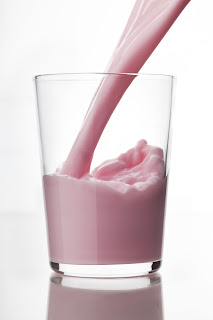 |
| There is little research to support the fact that skim milk is healthier than whole. Image: Shutterstock |
That’s been the belief pushed on us for many years by
nutritionists with an absolute outlook on caloric and fat intake as compared to
obesity. More calories and more saturated fat consumption equals obesity,
right? In a black-and-white picture, yes, that fact is true—but nutrition has
never been a black-and-white picture. If it were, we’d have it completely
figured out by now.
The basic premise of recommending skim and reduced fat milks
is that it will lead to reduced caloric and fat intake, therefore reducing the
risk for obesity. Unfortunately for that simplistic viewpoint, there isn’t much
scientific evidence to support it. Just because a food is “low-fat” doesn’t
mean it will lead to lower caloric intake.
 |
| Image: Shutterstock |
In fact, astudy published in March in the Archives of Disease in Childhood showed that kids who drank lower fat milks were
actually more likely to be obese
later in life than kids who drank whole milk. How is that possible? Foods with
lower fat content may not be as filling, and therefore consumers eat more to
compensate. Drinking whole milk, in comparison, is more filling and can
successfully satisfy hunger for much longer.
While overconsumption of whole milk could lead to problems
like high cholesterol, skim and reduced fat milks can also open the door to
serious health problems. Researchers say that because low fat milk is less
filling, it may lead consumers to seek out high-glycemic-index foods like
bagels, pasta, white rice, and instant oatmeal to tame hunger—and that can, in
turn, increase levels of triglycerides. Doing so may put consumers at a higher
risk for heart disease, high cholesterol, and hypertension.
 |
| Flavored milk may be lower in fat, but it's way higher in sugar content. Image: Shutterstock |
I certainly wasn’t the only kid who grew up loathing milk.
At school, my teacher actually called my mother in for a conference when I had
refused to drink milk at lunchtime and the nurse became concerned. They told me
all about the nutritional value of milk and how it was important that I drink
it if I wanted to grow up with strong bones. They tried to lure me in with
flavored milk, but I didn’t like it even with the added sugar, and I wouldn’t budge on my
hatred for milk.
I can’t to this day remember whether I ever drank my milk or
not. I do know that, now that I’m older, I find it quite ironic that my school
offered flavored milk but not whole. In their eyes, and many others’ eyes,
flavored milk was a way to lure kids into drinking milk. It had reduced fat—so
it’s better, right? Unfortunately, it also has several more grams of sugar per
cup. While whole milk contains 13 grams of sugar per cup, reduced fat chocolate milk contains about 24 grams. That, as you all know, is
something I find far more dangerous than a few grams of fat.
I’m certainly no scientist, nor am I a nutritionist; but the
fact that there is very little scientific basis to back up the claim that low
fat milks are “better” for kids and adults than whole milk seems worthy of
scrutiny. As much as I would love for nutrition and obesity to be
black-and-white issues, they are not. That makes it incredibly important to put
our absolute convictions aside and really pay close attention to what science
and research actually tell us is true.
No comments:
Post a Comment